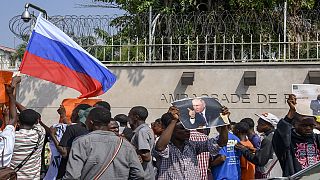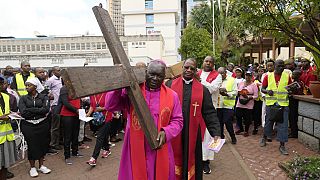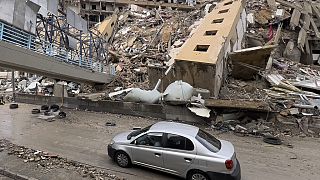Ivory Coast
Residents in the economic capital of the Ivory Coast react to the announcement by French President Emmanuel Macron that the French government will reduce the number of troops in Africa.
He was speaking in Paris ahead of a four-nation tour of central African countries from Wednesday, as France seeks to counter growing Chinese and Russian influence in the region.
Macron made the announcement on Monday of a "noticeable reduction" of French troop presence in Africa, where anti-French sentiment is running high in some former colonies.
Eugene Maye, a sanitation officer, the news is a welcome idea.
"The reduction of the number of French troops in Africa, I think it is a good thing, it is better. We are independent. An independent country does not need another army. If there is something to do, it is to help them, to train them and let them (African countries) defend themselves, defend their territory. We must even make them (French troops) leave, not reduce their numbers. Let them leave."
"The reduction of French troops in Africa, and especially in sub-Saharan Africa, is a positive initiative because it will allow these countries to be autonomous on the military level and on the political and economic level." added Marc Eba, a student.
Some welcome the news, while others are wary of the reduced international military support.
**"I think it is not too good if French troops leave Africa. In Ivory Coast for example, the FRCI (armed forces formed after the post-election crisis) have not had a good training to defend the country. But the French army can help the FRCI to defend the country."**added Donatien Yode, a resident.
Macron is to visit Gabon for an environmental summit, followed by Angola, then the Republic of Congo, or Congo-Brazzaville, and finally the neighbouring Democratic Republic of Congo.
Paris has fallen out with new military authorities in Mali and Burkina Faso, withdrawing its troops from both former French colonies after years helping the authorities there battle jihadists.
France still has thousands of troops in the wider Sahel region, including in Niger and Chad, but is seeking to tone down its presence on the ground.
Macron described this as a "reorganisation" of French military presence, rather than a withdrawal.
- 'Criminal mercenaries' -
Alarm has grown in Paris over the growing role of Russia in French-speaking African countries, alongside a Chinese push for influence that has been apparent for some years.
France and its Western allies accuse Russian mercenary group Wagner, infamous for its activities in Syria and Ukraine, of being active in Mali and the Central African Republic, also ruled by France in the colonial era.
Reports suggest Wagner is seeking to implant itself in Burkina Faso, claims Moscow dismissed last week.
In recent months, Paris has also accused Russia of spreading disinformation to undermine French interests on the continent.
Macron on Monday described Wagner as "a group of criminal mercenaries... acting as life insurance for failing regimes or those who seized power by force".
He dismissed the group as only bringing a "security response" to a country's issues, at the cost of "preying on mines, raw materials".
French sources earlier this year said a Wagner delegation had visited mineral-rich Burkina Faso, where a Russian firm already operates several gold mines.
Macron has insisted Africa is a priority of his second mandate in power, and in July he undertook a trip to Cameroon, Benin and Guinea-Bissau.
Monday's address followed a 2017 speech to students at a university in Burkina Faso in which he pledged to break away from his country's former post-colonial policies on the continent of more than 50 countries.
In that speech, he criticised "the crimes of European colonisation" and called for a "truly new relationship" between Africa and Europe.
- 'Mutual relationship' -
On Monday, Macron again sought to distance himself from the past.
"To measure our influence through a number of military operations... or to consider that certain economic markets are rightfully ours because we were there before -- these are things of the past," he said.
"We need to build a new balanced, mutual and responsible relationship" with African countries, he said.
He also said a new bill would be put forward in parliament in the coming weeks towards repatriating more artworks to African countries.
Calls have grown in Africa for Western countries to hand back colonial spoils from their museums and private collections.
French lawmakers in 2020 passed a bill allowing Paris to return artefacts to former colonies Benin and Senegal.
Macron will arrive in Gabon, a former French colony, on Wednesday to attend the One Forest Summit on preserving forests along the vast Congo River basin.
He will then head to the former Portuguese colony of Angola as part of a drive to enhance French ties with English- and Portuguese-speaking parts of Africa.
After Congo-Brazzaville, another former French colony, he will end his trip in the neighbouring Democratic Republic of Congo -- ruled by Belgium during the colonial era -- on Friday and Saturday.











01:00
Tunisia: French student detained for weeks, flies back home
01:29
Mbappé once again left out of France squad
01:00
Juliette Binoche launches Paris Christmas window display
01:02
Imane Khelif files legal complaint over reports alleging she has XY chromosomes
00:55
Algerian-French writer Kamel Daoud wins top French literary prize
Go to video
Morocco: Economist arrested during Macron's visit